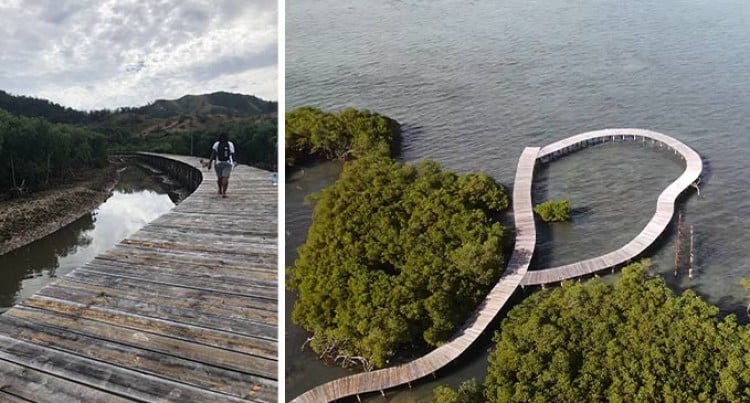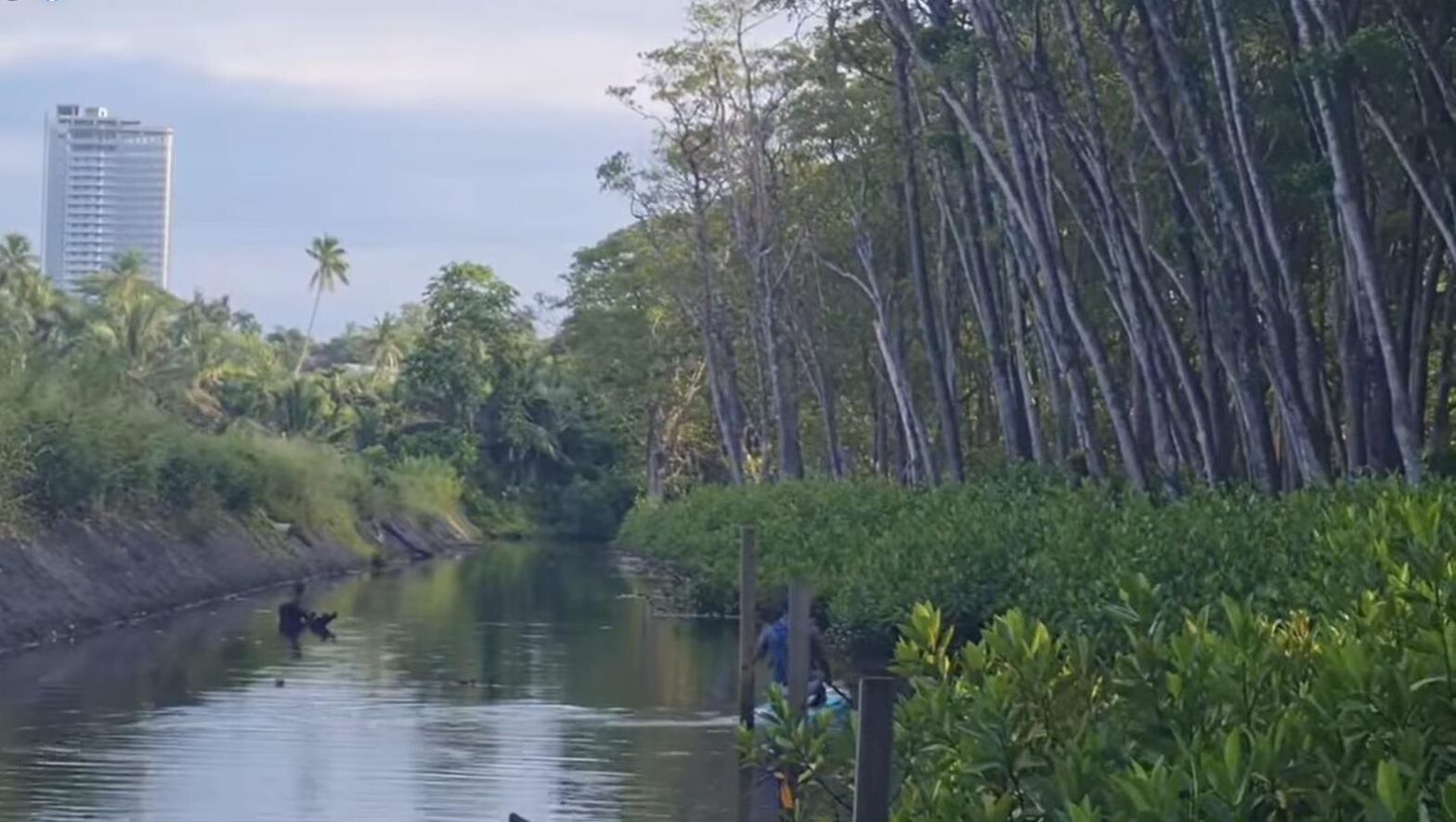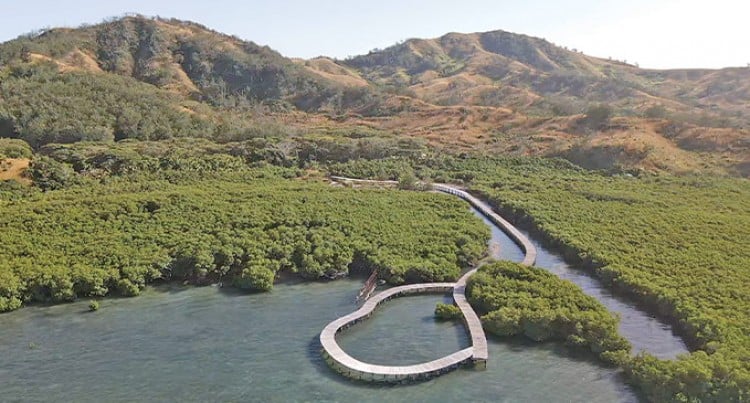When they developed the area, our catch wasn’t like before. The number of fish and crabs we used to catch before all dropped.
Sereseini Naso and the village women of Yaro and Solevu on Malolo Island can always count on the bounty of the sea surrounding their communities to help sustain their families.
But things changed when development work for a tourism investment started between 8 June 2017, and 6 December 2018.
While the site can’t be seen from the populated areas of Ms Naso’s home village of Yaro, she and other villagers can hear the whirring of heavy machinery, even at night.
They felt helpless and could do nothing but wait for what this project would bring to their communities.
“The developed site was one of the popular spots for women to catch crabs and fish,” Ms Naso said.
Yaro Village is located near the development site of the Freesoul Real Estate Development (Fiji) PTE Limited. The second village on the island is called Solevu.
The exact site of the Freesoul development sits on a piece of land known by locals as Wacia. Freesoul was granted a 99-year tourism lease by the iTaukei Lands Trust Board (iTLTB) to develop Wacia.
This followed the usual consensus process required by the iTLTB. But a continuing dispute between two tribes in Solevu Village claiming ownership of Wacia. Both Solevu and Yaro villages are at least 30 minutes away by boat from Wacia.
The three sites are located on Malolo Island. The island is in the Mamanuca archipelago. It is surrounded by fringing reefs and azure waters.
It is about a 30-minutes to 45-minutes boat ride from the Denarau mariner in Nadi. The foreshore along Wacia is a popular spot for fishing and catching crabs for the villagers. It’s one of the few income-generating activities they’ve grown up with all their lives.
Freesoul had invested in a multimillion-dollar project. It planned to construct 350 overwater villas and a casino.
But in a landmark court ruling in April, it was heard that Wacia, including the foreshore, had been illegally developed since 2017. Only a stop order issued in December 2018 had ceased all work.
It was heard during the court trial that Freesoul was directed to stop work until the Environmental Impact Assessment (EIA) was approved, and they must quickly complete the EIA process. It was also heard in court that Freesoul was advised to revive the foreshore.
The company was handed a hefty fine by the High Court in Suva. But while work may have stopped, the environmental damage done is irreversible.
Women on Malolo have observed the decline in their catch since the developments began.
Village men also claim that vegetation has been lost. Their food source was destroyed. “When they developed the area, our catch wasn’t like before.
The number of fish and crabs we used to catch before all dropped,” villager Raijieli Kube said. Villagers also fear that the clearing of mangroves now exposes them to more climate risks such as salinisation and landslides because of king tides.
Several attempts to get a comment from Freesoul were unsuccessful when this edition went to press.
Wacia Land and Foreshore
The ownership of Wacia was an ongoing court matter between two tribes of Solevu Village – the Nataubere and Narukusara tribes. The traditional landowners of Wacia are said to be the Nataubere tribe.
There are four tribes in Solevu Village. The elders of the Nataubere tribe had given Wacia to the elders of the Nataubere tribe to use for farming.
It was the Nataubere tribe that had approved the leasing of Wacia to Freesoul. Nataubere favours development. They had benefited from the development in cash and assistance in housing.
But the development of Wacia by Freesoul was deemed illegal by the High Court in Suva given the extent of the environmental damage.
High Court Judge Justice Daniel Goundar, in his ruling, said: “The offender was involved in a large-scale tourism development for economic gain, causing damage to the environment.”
“The land-based tourism project, if completed, may have benefited the community, but the harm that the offender has caused to the environment has diminished the benefits of that development.”
In April this year, Justice Goundar fined Freesoul $1 million for illegal developments between June 8, 2017, and December 6, 2018. This was a landmark court judgment: the first of its kind in Fiji.
The hefty $1million fine was only for the damage done to the foreshore, not on Wacia land. The foreshore belongs to the State, and the fine is to be paid to the State.
The iTaukei Land Trust Board (iTLTB) land ownership booklet states that “all foreshore lands below mean high water mark, the soil under Fiji waters and the beds of navigable rivers and streams are State land”.
Incomplete Development
It’s been more than three years since work on the six-acre Wacia land had ceased. Justice Goundar had ordered Freesoul to post a refundable environmental bond of $1.4 million with the Department of Environment and rehabilitate the affected areas at its own expense.
He ordered that the bond may only be refunded once the Department of Environment was satisfied with the rehabilitation. But there has yet to be any rehabilitation work carried out on the damaged foreshore.
Justice Goundar had said in his ruling that the affected area could not be restored to its original state because there was no regard for the marine life and corals that existed where the channel was dug.
Heavy machineries such as diggers, tractors, rollers, trucks, and concrete mixers remain visible on the reclaimed site. Timber, concrete blocks, incomplete workers quarters, and villas are covered in weeds, some rusted and lay in ruins along Wacia.
A mass number of mangroves were cleared to build an access road.
Solevu villager and member of the Nataubere tribe, Sekove Nasilasila, said the investment company had plans to clear all the mangroves along the foreshore.
Gone is our fisheries and vegetation: Nataubere Tribe
The Nataubere tribe had condemned the illegal development of Wacia. Mr Nasilasila said they were not aware of the plans for development or the consent to lease Wacia to Freesoul.
He said their tribe did not benefit from the development, except that the villagers lost a good spot where they used to catch fish and crabs.
“Now, Freesoul has opened up the foreshore by digging a channel and also reclaimed the land on Wacia by clearing mangroves,” he said.
“Mangroves are useful because they stop landslide and big waves from hitting the shoreline. They are also the perfect habitat for crabs and fish.”
Mr Nasilasila said it was good that the stop order was issued early, otherwise they would’ve lost all the mangroves.
“There is now a slow regrowth in mangroves, the return of crabs and fishes. Before there was nothing that could be found along Wacia.”
Another tribe member, Samuela Namuatabu, said the development destroyed their fisheries.
“There were pit toilets that had their drainage pointed out into the mangroves. During high tide, you can see toilet paper and waste. That is polluting our fisheries and was an unhygienic working site,” Mr Namuatabu said.
“Machines that were used were heavy, these added to the destruction to our shoreline. Also, they cleared our mangroves to build an access road and houses for workers.”
Mr Namuatabu said crabs and fish were in abundance before the development, but they had disappeared. Now, they are slowly returning. He said the development was good if it was done properly.
“Everything done to the environment now will affect our generations to come and Malolo will be their home too,” he said. “
This would be worsened by the impacts of climate change. The damage on land goes back to the ocean, affecting our food source.” He said there were more than 18 resorts along the Malolo group of islands.
“I don’t see the rationale behind having another one that has destroyed so much.”
Development had its benefits: Narukusara Tribe
The faction who had supported the development had seen the long-term benefits of the development – the jobs created and the income for the landowners.
Most of them belong to the Narukusara tribe. A member Vero Namira Soroverata said they had supported and approved the lease for Freesoul because of the deal they had made with the company that no other investors had made with the landowners.
“We have had investors before wanting to lease the land. After dialogue and approval given, we sign the contract, they start work, and then we receive lease money, that’s it,” Mr Soroverata said.
“We were benefiting financially when we had given the green light for the lease to be granted, but no more now because of the court judgment,” he added. Every year the tribe received $20,000 worth of Christmas shopping.
In addition, they were assisted with housing materials for the construction of their homes. Schools nearby were provided with solar panels.
“Before the development, Freesoul was supposed to give us three boats, and 10 houses were to be constructed as part of the memorandum of understanding, but this was partially fulfilled because of the court judgment,” Mr Soroverata said.
So far, five houses have been constructed, two 40 horsepower motor engine boats given, and development for the primary and secondary schools.
He refuted claims made by Yaro Village women that they could not find any crabs because it was probably out of season.
Ulaiasi Tuivunilagi, another villager who supported the development, said the development would benefit the 14 provinces in Fiji because it would generate employment.
“We the Taubeni clan, we were supported with two boats and engines, and two new houses. All houses were renovated by Freesoul,” he said.
The Taubeni clan is part of another tribe, also known as Taubeni. “Freesoul did an amazing job with assisting us the iTaukei.”
Legal Comment
The Office of the Director of Public Prosecutions (ODPP) said the interests of the landowners were matters for the Ministry of iTaukei Affairs, especially the Native Land Commission, the iTLTB, and the Ministry of Lands to address.
“ODPP had sanctioned charges against the lessee, Freesoul, for the unauthorised development under the Environment Management Act 2005,” it said.
ODPP said the removal of heavy machinery on site were prerogatives of the company and the Ministry of Environment.
The Ministry of Environment did not wish to comment, but instead directed all questions to the ODPP as their legal representative.
Conclusion
Villagers of Solevu and Yaro hope that the damage done to their foreshore would be revived soon for the sake of their future generation.
For now, mangroves are starting to regrow, and villagers are noticing the return of crabs and fishes. But the question remains.
What happens to the heavy machineries, trucks and rusted building materials, and villas on the developed Wacia site. Will they be removed? They are already an eyesore to visitors to the site.
The more they are left to rust, the more environmental damage they cause on Malolo Island.
This story was produced with the support of Internews’ Earth Journalism Network




